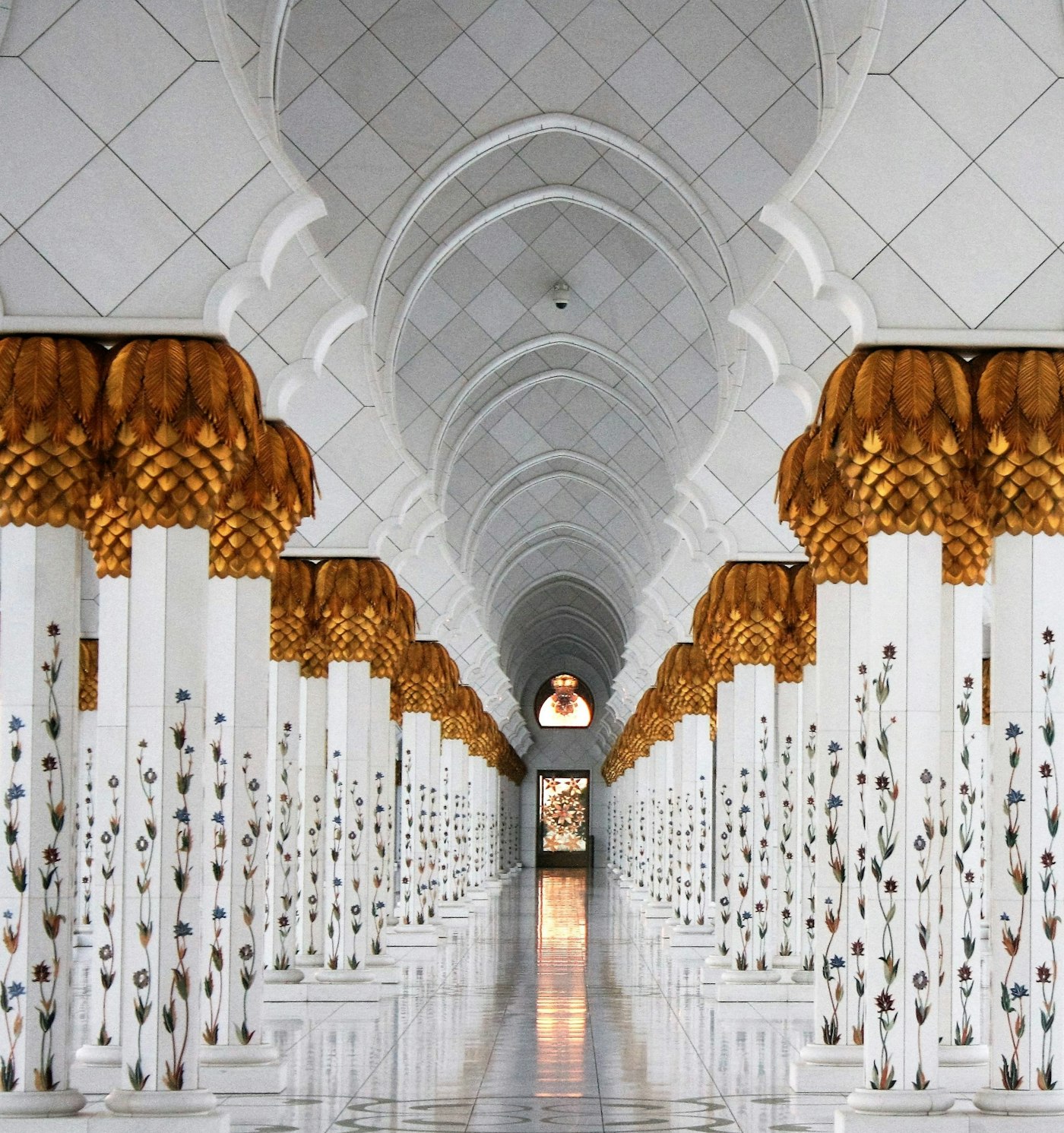Back to Basics: Understanding the 6 Pillars of Faith to Transform Your Life
by Ammarah Ahmed in Culture & Lifestyle on 21st February, 2023
 In today’s rapidly changing world, it is important that we prioritize nurturing our faith so that it remains a constant in our lives. Islam provides us with peace and purpose, keeping us grounded within ourselves. Refining our faith with knowledge and unwavering conviction is instrumental in our journey towards becoming well-rounded Muslims.
In today’s rapidly changing world, it is important that we prioritize nurturing our faith so that it remains a constant in our lives. Islam provides us with peace and purpose, keeping us grounded within ourselves. Refining our faith with knowledge and unwavering conviction is instrumental in our journey towards becoming well-rounded Muslims.
Building a house begins with laying a foundation. Without the pillars at its base, a house has no stability. Likewise, your ibadah needs a solid foundation of iman.
Islam bears Six Pillars of Faith, known as Arkan al-Iman. Belief in them brings us closer to Allah (SWT). The way we manifest our faith is through worship, and the Six Pillars of Faith are the foundation that keeps the believer rooted in acts of worship.
The Hadith of Jibreel (AS) carries substantial core Islamic knowledge within it, and is a great way of understanding what it means to be a Muslim. The following is an excerpt regarding faith:
“He (the inquirer) said: Inform me about Iman (faith). He (the Holy Prophet) replied: That you affirm your faith in Allah, in His angels, in His Books, in His Apostles, in the Day of Judgment, and you affirm your faith in the Divine Decree about good and evil. He (the inquirer) said: You have told the truth. … He (the narrator, Umar ibn al-Khattab) said: Then he (the inquirer) went on his way but I stayed with him (the Holy Prophet) for a long while. He then, said to me: Umar, do you know who this inquirer was? I replied: Allah and His Apostle knows best. He (the Holy Prophet) remarked: He was Gabriel (the angel). He came to you in order to instruct you in matters of religion.” – [Sahih Muslim]
The Six Pillars of Faith
1. Belief in One God
“Say, ‘He is God, the One. God, the Self-sufficient One. He does not give birth, nor was He born, and there is nothing like Him.” [Quran 112]
Tawheed is the Islamic concept of the absolute Oneness of God. This is the essence of Islam, and of the utmost importance to the believer. In fact, it completes one half of our attestation to Islam (Shahada):
I bear witness that there is no god but Allah, and I bear witness that Muhammad is the Messenger of Allah.
Tawheed can be further understood by breaking it down into its three aspects:
- Tawheed ar-Ruboobiyyah (Lordship): Allah is the One True God; the sole Creator; all things are under His Dominion, and at His Mercy.
- Tawheed al-Asma was-Sifaat (Names and Attributes): The 99 Names of Allah are all His attributes, and He, alone, is the Manifester of them.
- Tawheed al-Uloohiyyah (Worship): The right to be worshiped belongs only to Allah. All of our Ibadat (prayer, fasting, Hajj, charity and so forth) is dedicated only to Allah.
Simply put, the believer acknowledges that Allah is Malik-al-Mulk – the Owner of All. Tawheed disciplines all acts of worship, thus liberating the soul from futile thinking.
“He is Allah – there is no god except Him: the King, the Most Holy, the All-Perfect, the Source of Serenity, the Watcher [of all], the Almighty, the Supreme in Might, the Majestic. Glorified is Allah far above what they associate with Him [in worship]!” [Quran 59:23]
2. Belief in the Angels
The Angels are one of the creations of Allah. They are in complete submission to Him, and are tasked with different duties.
For example, every human is assigned four angels:
Two recording angels: our every deed – good or bad – is written by these Angels. This helps us in our Taqwa, or awareness of Allah. Therefore, we prioritize good deeds.
Two guardian angels: they are assigned for our protection. This serves as a constant reminder of Allah’s Mercy to His servants.
The Archangels are a sign of Allah’s power over all things. They are among the highest rank of the Angels, and they carry out the Command of Allah:
- Jibreel (AS): to deliver revelation to the Prophets
- Mikhaeel (AS): to deliver sustenance (e.g. through weather)
- Israfeel (AS): to blow the trumpet signaling the start of the Day of Judgment
- Malak al-Mawt (Angel of Death): to collect souls at the time of death
“[The angels respond,] “There is not one of us without an assigned station [of worship]. We are indeed the ones lined up in ranks [for Allah]. And we are indeed the ones [constantly] glorifying [His praise].” [Quran 37:164-166]
3. Belief in the Scriptures
Allah gave mankind Scripture as a source of direct guidance. These include:
- Scrolls or Suhof to Abraham (AS)
- Psalms or Zabur to David (AS)
- Torah or Taurat to Moses (AS)
- Gospel or Injeel to Jesus (AS)
- Quran to Muhammad (ﷺ)
Scripture is a means of obtaining knowledge and abandoning ignorance. The Quran is a confirmation of the previous Scriptures and is thus the final and supreme Scripture for all of humanity. It has not been altered or corrupted since its revelation over 1,400 years ago, whereas the true meanings of the previous Scriptures have been lost in translation over time.
“It is certainly We Who have revealed the Reminder, and it is certainly We Who will preserve it.” [Quran 15:9]
Scripture plays a vital role in our lives in several ways – whether it’s through recitation, the five daily prayers, or in the way we carry ourselves. The Quran holds the answer to our day-to-day and “big picture” concerns. When we recite the very first chapter of the Quran, Surah Fatiha (The Opening), we directly ask Allah for guidance to the straight path. The Quran then unfolds 113 more chapters, in which we find that guidance through instructions, parables, and the dua made by Prophets when they were afflicted with calamity. When we apply this knowledge, we walk along the path of truth and wisdom everyday, and are brought closer to Allah.
“In their stories there is truly a lesson for people of reason. This message cannot be a fabrication, rather [it is] a confirmation of previous revelation, a detailed explanation of all things, a guide, and a mercy for people of faith.” [Quran 12:111]
4. Belief in the Messengers
Every Prophet throughout the ages had the same mission of delivering one central message to his people. Belief in the Prophets is believing that they all came with the indubitable truth: the shared message of monotheism.
The Quran mentions 25 Prophets by name, including Noah, Abraham, Moses and Jesus. Peace be upon them all. The Prophet Muhammad (ﷺ) is the last prophet sent to mankind, and religion was perfected with him for all of humanity.
“We never sent a messenger before you [O Prophet] without revealing to him: “There is no god [worthy of worship] except Me, so worship Me [alone].” [Quran 21:25]
Through their stories, we are taught how to perfect our faith, worship and character. It is important to know each Prophet’s struggle in delivering the message. Sometimes the right path is lonely, but they show us how to persevere in the face of adversity. That hardship can resonate with us today, and empower us to strive hard in our religion.
5. Belief in the Day of Judgment
“And certainly the Hour is coming, there is no doubt about it. And Allah will surely resurrect those in the graves.” [Quran 22:7]
Belief in the Day of Judgment is a driving force for believers to be mindful of their deeds. Everyone will face accountability; your actions in this life determine the fate of your Afterlife. The knowledge of when this Day will come is only with Allah. It is also a consolation for the believers because Allah promises the ultimate compensation for everyone on this Day.
“We will set up the scales of justice on the Day of Judgment, so no soul will be wronged in the least. And [even] if a deed is the weight of a mustard seed, We will bring it forth. And sufficient are We as a [vigilant] Reckoner.” [Quran 21:47]
6. Belief in the Divine Decree
Belief in the Divine Decree means recognizing that Allah has knowledge of all things – past, present and future. Nothing can happen, nothing can exist, without it being decreed by Allah, Who is Al-’Aleem – the All-Knowing.
Everything – your sustenance, your lifespan – has already been written by Allah. As humans, we still have a responsibility to make the right choices, ensuring that we continue upon the right path and gain His mercy. We work to the best of our ability, make heartfelt supplication and leave the rest to Allah. This is known as Tawakkul. Having this trust in Allah’s plan is one of the best ways we can reduce anxiety about our future. Allah’s knowledge is paramount.
“[He is] the Originator of the heavens and the earth! When He decrees a matter, He simply tells it, “Be!” And it is!” [Quran 2:117]
Build Your Foundation
In today’s world, much of the information people consume is fleeting. By understanding the Six Pillars of Faith, we hold firm to an undying truth. The Six Pillars are universal tenets through which humankind can understand Allah’s plan, and realize the purpose of life. Connecting with the central teachings of Islam is important, and researching the Hadith of Jibreel (AS) is a great way to do this.
Seated within the Six Pillars is an abundance of knowledge. They are a beneficial outline for those interested in further delving into Islam and its basic beliefs. Obtaining this knowledge is a form of self-discipline. Yet, it amazingly allows us to connect with something bigger than ourselves.
“This [Quran] is enlightenment for mankind and guidance and mercy for a people who are certain [in faith].” [Quran 45:20]

Ammarah Ahmed
Ammarah is a South Asian Muslim writer born in the U.S. who focuses primarily on Muslim identity. She believes in the power of the pen, and seeking and spreading knowledge. Her goal is to reclaim the narrative on Muslims through her writing to inspire peace and understanding.